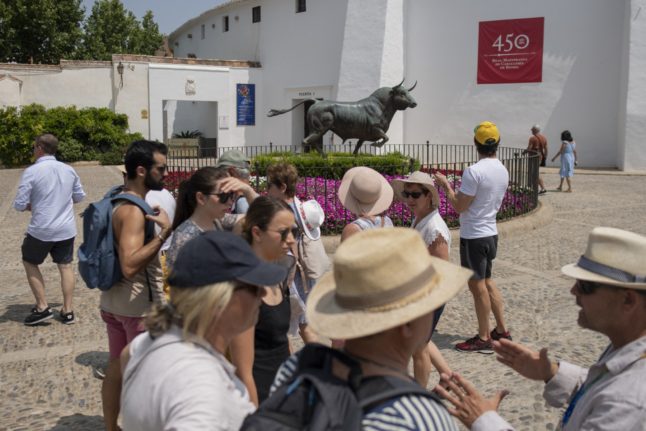If you’re heading home to spend Christmas with family or they’re coming out to stay with you, be aware of the rules regarding food and drink, and what you can and can’t bring in and out of Britain and the EU.
Read the Local’s guide below to make sure you aren’t caught out at customs.
Flying to the UK from Spain
For those returning to the UK from Spain, the rules are relatively lax.
Note, if you’re spending Christmas in Northern Ireland there are different rules on food and animal products. Find them here.
You can bring the following products from Spain into the UK without worrying about any restrictions:
-
bread, but not sandwiches filled with meat or dairy products
-
cakes without fresh cream
-
biscuits
-
chocolate and confectionery, but not those made with unprocessed dairy ingredients
-
pasta and noodles, but not if mixed or filled with meat or meat products
-
packaged soup, stocks and flavourings
-
processed and packaged plant products, such as packaged salads and frozen plant material
-
food supplements containing small amounts of an animal product, such as fish oil capsules
Meat, dairy, fish and animal products
If, like many of us, you have friends and family already putting in their orders for stocks of jamón serrano, know that the rules on bringing meat, dairy, fish and other animal products into the UK are relatively relaxed. You can bring in meat, fish, dairy and other animal products as long as they’re from the EU, so your jamón and Manchego cheese are safe.

Alcohol allowance
For many, the big one, but there are some limits on how much booze you can bring in from Spain and the EU more generally. How much you can bring depends on the type of alcohol, so get up to speed on the limits and make sure your favourite Rioja or Cava isn’t taken off you or heavily taxed:
Limits:
-
beer – 42 litres
-
still wine – 18 litres
-
spirits and other liquors over 22 percent alcohol – 4 litres
-
sparkling wine, fortified wine (port, sherry etc) and other alcoholic drinks up to 22 percent alcohol (not including beer or still wine) – 9 litres
It’s worth knowing that you can split your allowance, for example you could bring 4.5 litres of fortified wine and 2 litres of spirits (both half of your allowance).
Flying into Spain from the UK
While British borders are laid back when it comes to travelling with food and drink, the rules on food and drink are much tougher when entering the EU from the UK.
Most importantly, tea bags – longed for by Brits the world over – are allowed. Marmite, which is vegan, is also OK but Bovril, which contains beef stock, is not.
Travellers arriving in the EU from Britain can, according to the European Travel Retail Confederation (ETRC), bring the following quantities of alcohol, so if you fancy a British tipple in Spain over Christmas it is possible, within reason: 4 litres of still wine and 16 litres of beer, 1 litre of spirits, or 2 litres of sparkling or fortified wine.
If you arrive in the EU from a non-EU country, you cannot bring any meat or dairy products with you. That means no Wensleydale, no Cornish Brie, and no British bacon to enjoy in Spain over Christmas.
The EU’s strict rules mean that all imports of animal-derived products technically come under these rules, so no cream or fresh milk products either.
Similarly, if you’re planning on asking a friend or family member to bring you over some sweets, cakes, or other home comforts, be aware that the ban includes all products that contain any meat or dairy as an ingredient. In reality, though, Spanish authorities will usually let you bring in things containing processed milk products such as packaged chocolates and custard powder.
You are allowed to bring a small quantity of fruit and vegetables as well as eggs, some egg products, and honey. Restricted quantities of fish or fish products are also allowed: eviscerated fresh fish products (gutted, with all the organs removed), and processed fishery products are allowed up to 20 kg or 1 fish, so you can enjoy some Scottish smoked salmon in Spain over Christmas if you want.

If you’re travelling with kids, note that powdered infant milk, infant food and specifically required medical foods are allowed up to 2kg, as is the case for pet foods.
Even classics like some Christmas puddings and some mince pies are banned because they contain suet, but most of the regular packaged kinds from the supermarkets should be allowed.
It is worth noting that these strict EU rules also apply to sending products by post, so if you were hoping to get around the newly applicable legislation by having someone send you a delivery of cheese, they will probably be intercepted and confiscated by Spain’s postal service, unfortunately.
READ ALSO: How Brexit will affect the postal service between Spain and the UK over Christmas
Article by Conor Faulkner



 Please whitelist us to continue reading.
Please whitelist us to continue reading.
Do these restrictions apply to checked-in luggage or just carry-on when coming to Spain?